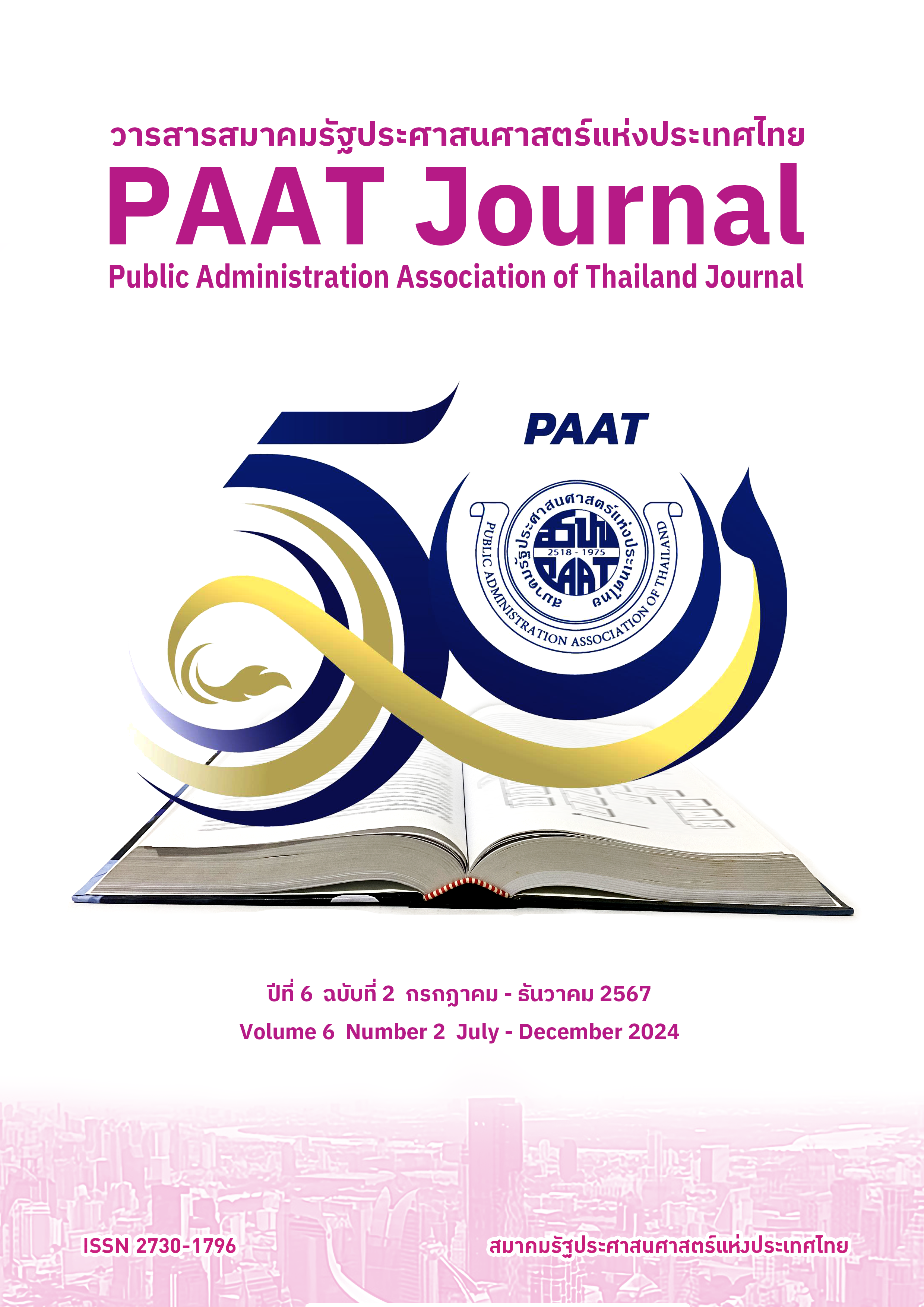การขับเคลื่อนเศรษฐกิจไทยผ่านมุมมองการสร้างนโยบายการแข่งขัน
คำสำคัญ:
นโยบายการแข่งขัน, การพัฒนาเศรษฐกิจ, ความเจริญเติบโตทางเศรษฐกิจ, ความเหลื่อมล้ำบทคัดย่อ
ที่ผ่านมาประเทศไทยมีแนวนโยบายที่หลากหลายเพื่อพัฒนาเศรษฐกิจ อย่างไรก็ตามหลักฐานเชิงประจักษ์ชี้ให้เห็นว่าในช่วงหลายทศวรรษที่ผ่านมาประเทศไทยกลับประสบปัญหาการเจริญเติบโต
ที่ชะลอตัว ในขณะที่แนวโน้มความเหลื่อมล้ำสูงขึ้นอย่างมาก สะท้อนให้เห็นถึงการพัฒนาเศรษฐกิจในช่วงที่ผ่านมามองข้ามฟันเฟืองชิ้นสำคัญในการพัฒนาเศรษฐกิจของประเทศ บทความนี้นำเสนอว่าฟันเฟืองการพัฒนาเศรษฐกิจที่ขาดหายอาจเป็นกลไกตลาดอันจะส่งเสริมการแข่งขันในตลาดที่เหมาะสมอันเปรียบเสมือนโครงสร้างพื้นฐานทางเศรษฐกิจที่จะสร้างแรงกระตุ้นแก่ภาคเศรษฐกิจต่าง ๆ ผ่านประสิทธิภาพในการจัดสรรทรัพยากร ประสิทธิภาพการผลิต และประสิทธิภาพเชิงพลวัต อันจะสร้างการเจริญเติบโตทางเศรษฐกิจในขณะที่ลดการกระจุกตัวของทรัพยากร อย่างไรก็ดีจากประสบการณ์จากต่างประเทศพบว่าการผลักดันแนวนโยบายการแข่งขันให้เกิดผลสัมฤทธิ์ ต้องอาศัยการวางเป้าหมายด้านการแข่งขันที่ชัดเจน การทำงานสอดคล้องกันระหว่างองค์ประกอบส่วนต่าง ๆ ของนโยบายการแข่งขัน นอกจากนี้ต้องการผลักดันนโยบายการแข่งขันที่จริงจังโดยรัฐบาล พร้อมทั้งการทำงานร่วมกันระหว่างหน่วยงานต่าง ๆ ทั้งภาครัฐและภาคเอกชน บทความนี้ศึกษาความสำคัญของการแข่งขัน การพัฒนานโยบายการแข่งขัน พร้อมทั้งนำเสนอบทเรียนจากต่างประเทศอาจเป็นประโยชน์ต่อประเทศไทยในการขับเคลื่อนนโยบายการแข่งขัน เพื่อเป็นแพลตฟอร์มในการสร้างความสามารถในการแข่งขัน และความได้เปรียบในการเชิงแข่งขัน เพื่อแก้ปัญหาการพัฒนาเศรษฐกิจในระยะยาวทั้งการเจริญเติบโตทางเศรษฐกิจของประเทศและการลดความเหลื่อมล้ำต่อไป
เอกสารอ้างอิง
สำนักงานคณะกรรมการพัฒนาการเศรษฐกิจและสังคมแห่งชาติ. (2534). แผนพัฒนาเศรษฐกิจและสังคมแห่งชาติ ฉบับที่ 7 (พ.ศ. 2535-2539). กรุงเทพฯ
Igelski, M. (2018). The role of intellectual capital in building a competitive advantage for companies from the Baltic Sea Region in the transport, shipping and logistic industry (TSL). In SHS Web of Conferences (Vol. 57, p. 01015). EDP Sciences. DOI: https://doi.org/10.1051/shsconf/20185701015
United Nations Conference on Trade and Development (2023), Interaction between competition and industrial policies. From: https://unctad.org/system/files/officialdocument/ciclpd69_en.pdf
Tan, C. & Jie, M. N. (2016). The Role of Competition in Singapore’s Economic Growth and Public Policies.
European Parliament. (2013). The contribution of competition policy to growth and the EU 2020 strategy. From: https://www.europarl.europa.eu/RegData/etudes/etudes/join/2013/492479/IPOL-ECON_ET(2013)492479_EN.pdf
European Commission. (2024). Why is competition policy important for consumers?. From: https://competition-policy.ec.europa.eu/about/why-competition-policy-important-consumers_en
Parveer, Ghuman S. & Udai S. Mehta, (2019). Institutional Design of Select Competition Authorities in South Asia: Identifying Challenges and Opportunities, Review of Industrial Organization, Springer. The Industrial Organization Society, 54(2), 283-326.
OECD (2023), The Consumer Welfare Standard - Advantages and Disadvantages Compared to Alternative Standards, OECD Competition Policy Roundtable Background Note. From: http://www.oecd.org/daf/competition/consumer-welfare-standard-advantages-and-disadvantages-to-alternativestandards-2023.pdf.
Kennedy, J. (2018). Why the Consumer Welfare Standard Should Remain the Bedrock of Antitrust Policy. From: https://docs.house.gov/meetings/JU/JU05/20181212/108774/HHRG-115-JU05-20181212-SD004.pdf
Mungan, M. C., Scalia, A., & Yun, J. M. (2024). A Reputational View of Antitrust’s Consumer Welfare Standard. Houston Law Review, 61. From: https://houstonlawreview.org/article/92813-a-reputational-view-of-antitrust-s-consumer-welfare-standard
Wilson, C. S. (2019). Welfare standards underlying antitrust enforcement: What you measure is what you get Federal Trade Commission. From: https://www.ftc.gov/system/files/documents/public_statements/1455663/welfare_standard_speech_-_cmr-wilson.pdf (p. 12)
OECD. (2024). Pro-competitive Policy Reforms. From: http://www.oecd.org/competition/reforms
OECD. (2016). State-Owned Enterprises as Global Competitors: A Challenge or an Opportunity, OECD Publishing, Paris. From: https://doi.org/10.1787/9789264262096-en.
Duan, Y. & Yu, K. (2022). Research on Competitive Neutrality of SOEs with Special Functions. China Sustainability, 14(13), 7810. DOI: https://doi.org/10.3390/su14137810
Negara, D. S. (2023). Principle Of Competitive Neutrality For State-Owned Enterprises To An Access To Justice On Business Practices. From: https://www.ptun-surabaya.go.id/wp-content/uploads/2023/05/Jurnal-Dharma-Scopus-Q2.pdf
Sim, R. (2013) Making markets work for development: A reform agenda on competition-The speech to the World Bank Forum. From: https://www.accc.gov.au/about-us/media/speeches/australias-experience-driving-economic-growth-through-competition-policy-reforms-speechexperience-driving-economic-growth-through-competition-policy-reforms
World Economics. (2024). The Global Authority on Geographic Invest ability. From: https://www.worldeconomics.com/country-reviews/australia/
The Global Innovation Index. (2023). Australia ranking in the Global Innovation Index 2023. From: https://www.wipo.int/edocs/pubdocs/en/wipo-pub-2000-2023/au.pdf
The Global Innovation Index. (2023). Japan ranking in the Global Innovation Index 2023.From: https://www.wipo.int/edocs/pubdocs/en/wipo-pub-2000-2023/jp.pdf
Hatta, T. (2017). Competition policy vs. industrial policy as a growth strategy. Economic Research Institute for ASEAN and East Asia (ERIA). Working Papers DP-2016-40. From: https://ideas.repec.org/p/era/wpaper/dp-2016-40.html.
International Institute for Management Development (IMD). (2023). World Competitiveness Yearbook 2023. From https://www.imd.org/wp-content/uploads/2023/06/WCY_Booklet_2023-FINAL.pdf
The Global Innovation Index. (2023). Singapore ranking in the Global Innovation Index 2023. From: https://www.wipo.int/edocs/pubdocs/en/wipo-pub-2000-2023/sg.pdf
Philippine Competition Commissions. (2015). Philippine Competition Law (R.A. 10667)
The World Bank. (2024). Markets and Competition Policy. Fostering growth and shared prosperity by opening and transforming markets. From: https://www.worldbank.org/en/topic/competition-policy
ดาวน์โหลด
เผยแพร่แล้ว
รูปแบบการอ้างอิง
ฉบับ
ประเภทบทความ
สัญญาอนุญาต
ลิขสิทธิ์ (c) 2024 PAAT Journal (วารสารสมาคมรัฐประศาสนศาสตร์แห่งประเทศไทย)

อนุญาตภายใต้เงื่อนไข Creative Commons Attribution-NonCommercial-NoDerivatives 4.0 International License.



